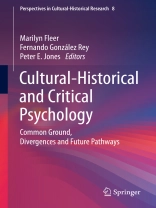This book opens up a critical dialogue within and across the theoretical traditions of critical psychology and cultural-historical psychology. It explores and addresses fundamental issues and problems within both traditions, with a view to identifying new avenues for productive discussion and cooperation between these two important movements in contemporary psychology. Accordingly, the book gathers contributions from a range of internationally respected researchers from both fields who have demonstrated a willingness to look critically, and self-critically, at their theoretical allegiances and trajectories. This book provides readers with the opportunity to both appreciate and reflect on fundamental differences of perspective across the ‘cultural-historical’/’critical’ psychology divide and, thereby, to consider and debate key issues facing the discipline of psychology more generally.
Зміст
1 Introduction: Advancing dialogues between critical pyschology and cultural-historical theory.- Section I Cultural-Historical and Critical Psychology: Entering a dialogue.- 2 Critical Psychology: Subjects in situated social practices.- 3 Critical psychology as cultural-historical psychology: Political dimensions and limitations of psychological knowledge.- 4 Looking towards a productive dialogue between cultural-historical and critical psychologies.- 5 The primary of critical theory and the relevance of the psychological humanities.- Section II Pathways of renovation: Critiques and innovations within cultural-historical and critical psychology.- 6 Can the concept of activity be considered as a theoretical device for critical psychologies?.- 7 Decolonising childhood, reconceptualising distress: A critical psychological approach to (Deconstructing) child well-being.- 8 Psychology and psychologies ‘from the Language End’: Critical reflections.- 9 Problematising pedagogical imports and creating new conditions for children’s development: A case from China.- 10 Nationalism and/or developing understanding of society?.- Section III The Emerging Themes.- 11 The two pathways of Vygotsky’s Legacy: The critical and non-critical co-existing positions in Vygotsky’s thought.
Про автора
Laureate Professor Marilyn Fleer holds the Foundation Chair of Early Childhood Education and Development at Monash University, Australia. She was awarded the 2018 Kathleen Fitzpatrick Laureate Fellowship by the Australian Research Council and is a former President of the International Society of Cultural-historical Activity Research (ISCAR). Additionally, she holds the positions of honorary Research Fellow at the Department of Education, University of Oxford, and a second professor position at the KINDKNOW Centre, Western Norway University of Applied Sciences.
Fernando Luís González Rey held the posts of Professor in the Faculty of Education and Health Sciences, University Centre of Brasília, Brazil, and senior Associate Professor in the Faculty of Education, University of Brasília. He obtained his Ph.D at the Institute of General and Pedagogic Psychology of Moscow and the degree of Doctor in Science from the Institute of Psychology of the Russian Academy of Sciences. At the University of Havana, he was Professor in the Faculty of Psychology (1973-1999), Dean of this Faculty (1987-1991) and Vice Rector (1991-1995). Awarded the Inter-American Prize of Psychology in 1991, his research interests focused on the problem of subjectivity within education and psychology from a cultural-historical perspective.
Peter E. Jones is Reader in Language and Communication in the Department of Humanities, Sheffield Hallam University. His research interests include general linguistics, communication theory and the philosophy of language, Marxism and the cultural-historical and activity theory traditions. He is currently preparing a book on the linguistic infrastructure of Vygotsky’s psychology. Other current projects focus on the pathologisation of nonstandard linguistic varieties in educational contexts, the communicational dimensions of cooperative activity, and the inter-dependence between perspectives on communication and radical social theory.












